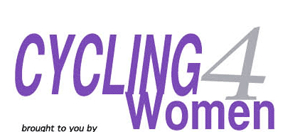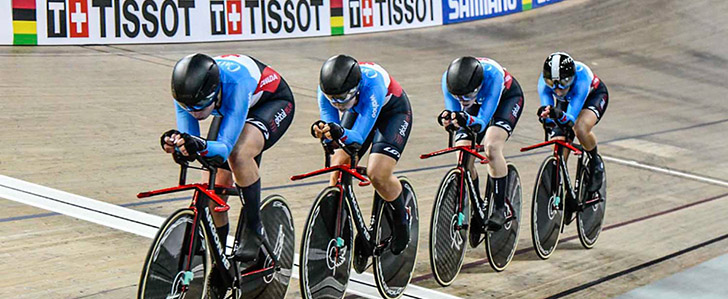April 16/23 16:43 pm - Alison Jackson Interview - Paris-Roubaix Champion
Posted by Editoress on 04/16/23
Last week, Canadian cyclist Alison Jackson made history by becoming the first Canadian, indeed the first North American, to win the legendary Paris-Roubaix cycling monument, female or male. Riding for EF Education-TIBCO-SVB, Jackson took the win after 110 kilometres in the break group, being chased down in the final kilometres by the favourites, outsprinting her breakaway rivals on the Roubaix track to win by a bike length. Alison spoke to us this week from her European home base in Girona, Spain.
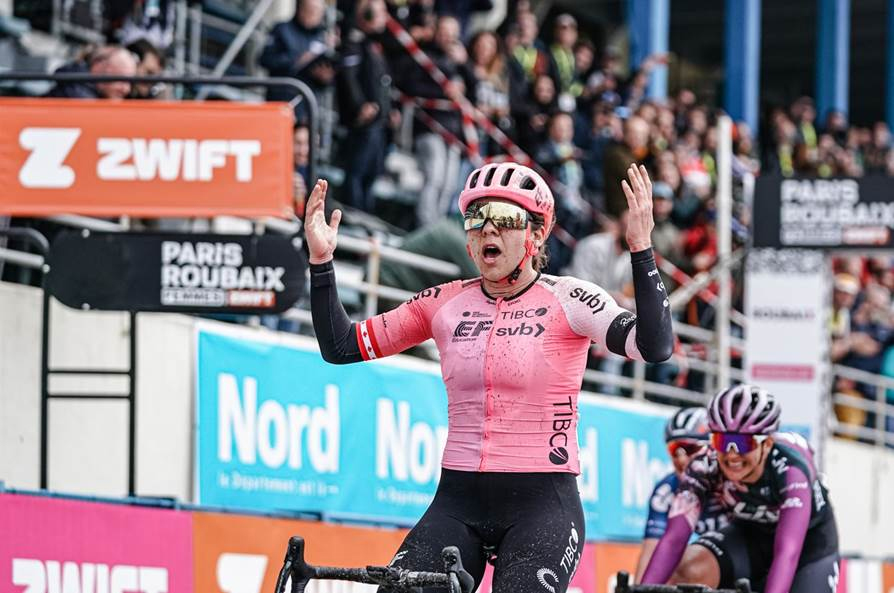
Photo A.S.O. / Thomas Maheux
Canadian Cyclist: So how's your week been? A little busy?
Alison Jackson: Incredibly busy [laughs].
CC: It was obviously a very big win. How much has that sunk in for you - first Canadian, first North American, to win Paris-Roubaix.
AJ: It's a great feeling becoming a legend! For sure it's a big deal for me and my career, but it's also a big day for Canada, for cycling as a sport; a result that I hope all Canadians can be proud of and boost our next generation of cyclists.
CC: This is the third year of the Paris-Roubaix for women, and you've done all three. Is this an event - with the rough roads and conditions - that you feel suits you, an event where you have thought, 'this is an event that I can do really well in?'.
AJ: I've done really well in the editions previous; the first edition was a super wet and chaotic race and I came away with three crashes and 24th place. Then we had the year of the dry race ... a wet Paris-Roubaix is not a fun race, it is totally just for the fans, not for the riders at all. I remember crossing the finish line and somebody saying 'are you ready for the next one in 6 months?'. I was like, 'oh my gosh, don't tell me that', because it was such an awful painful race.
But then when we had the second year, the dry edition, I absolutely really loved it. I loved the chaos of hopping from the cobblestones to the gutter, and trying to find your way, and bumping over the cobbles ... you have to keep fighting the whole day and you never know what can happen. So I came away with one crash and 13th place, so I was just thinking, 'if I can have a clean run throughout the day, with no mechanicals or bad luck, then I believed I could be in contention to try to take the win'.
Continues below photos
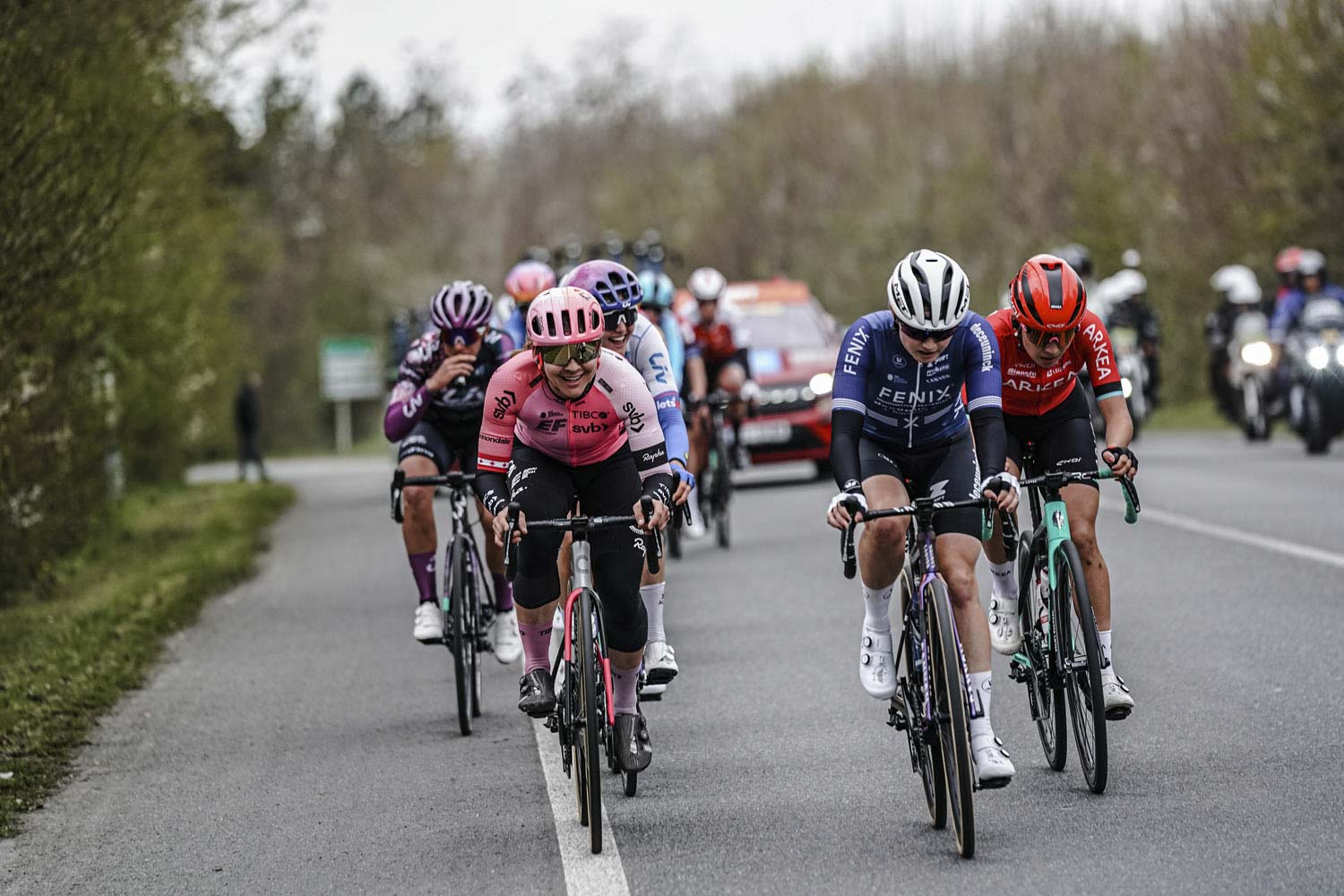
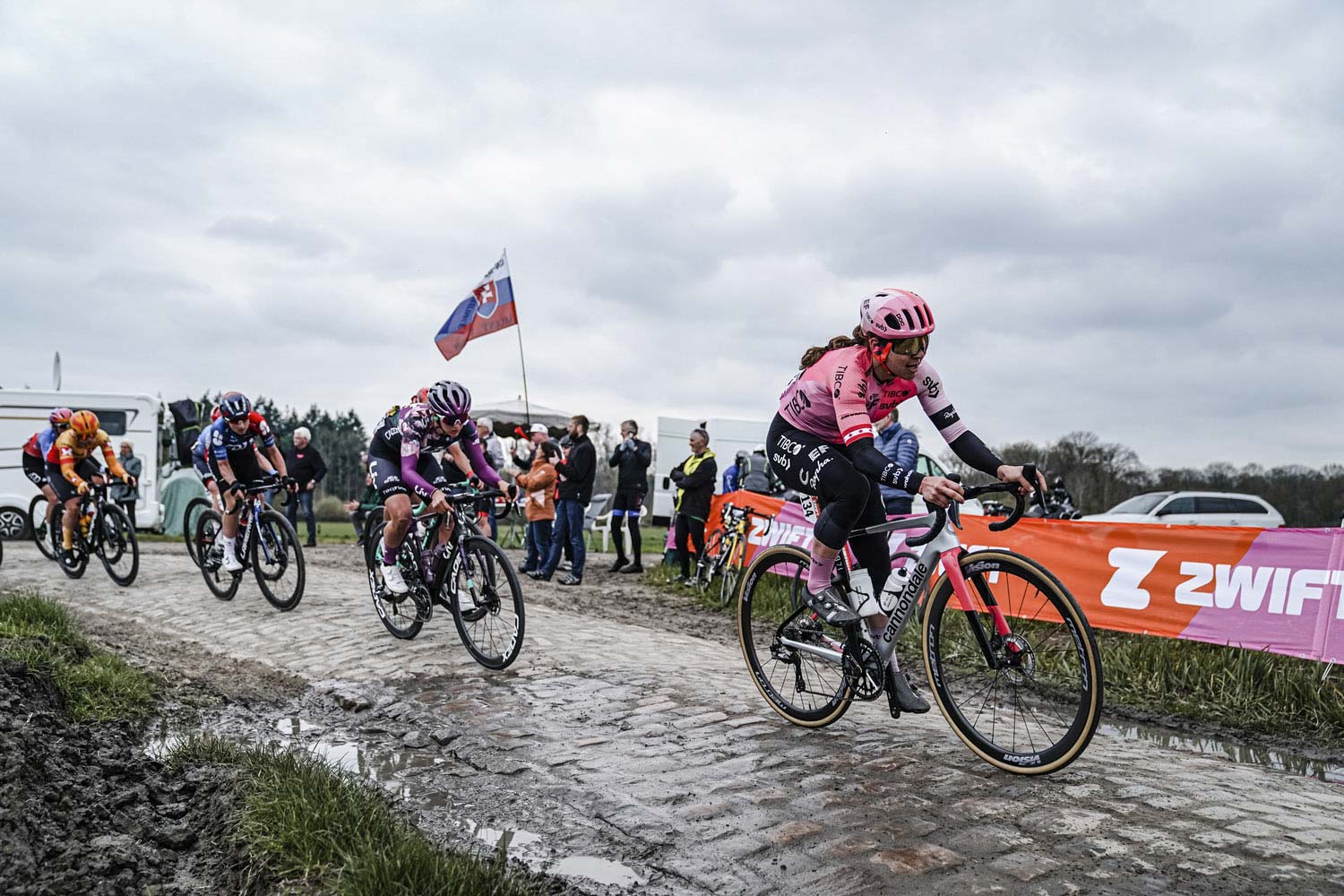
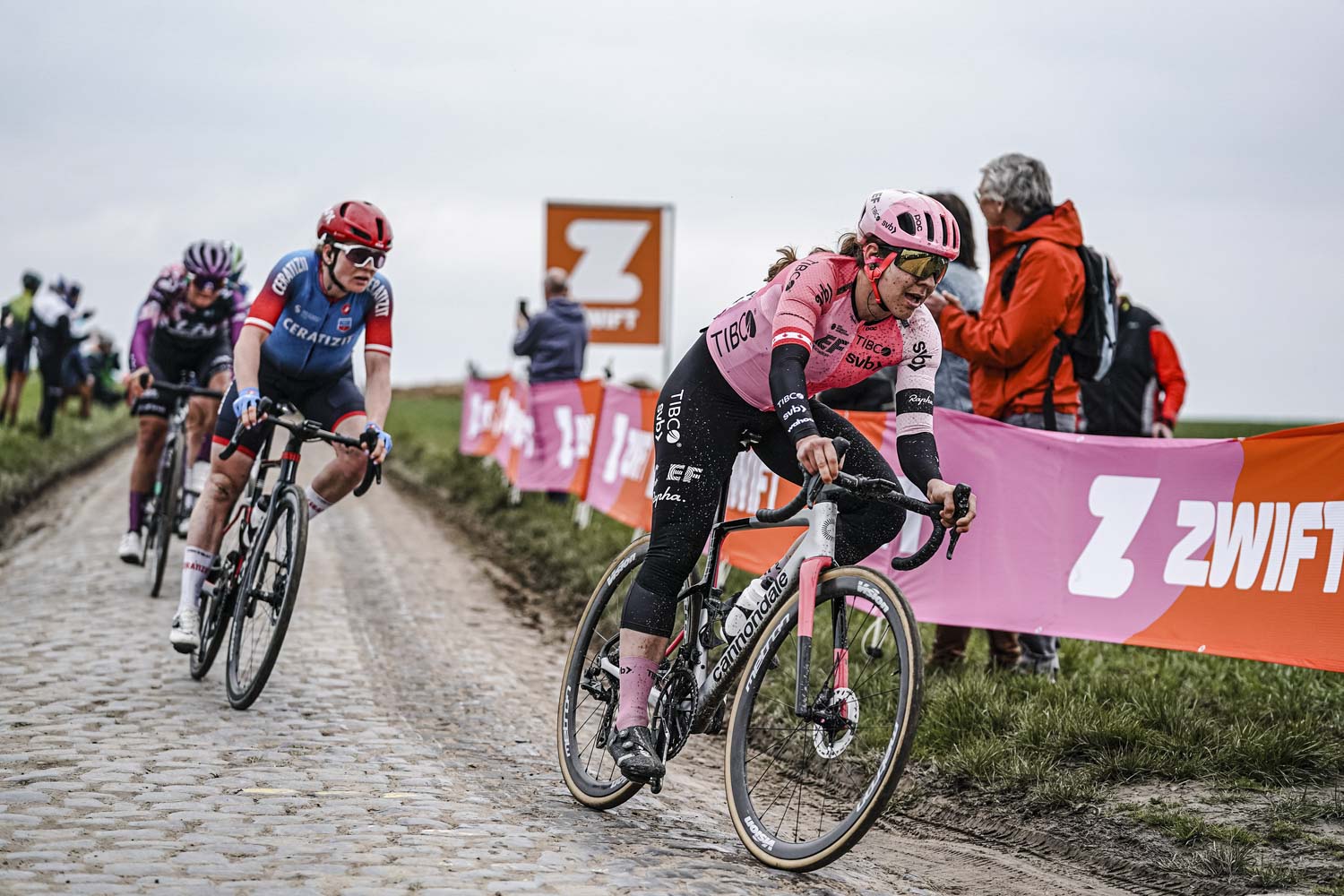
Photos A.S.O. / Thomas Maheux
Cobbles suit me. A good hard race, anything that's going to be really, really hard and is an attritional race is going to be good for me; one that takes a fighting spirit. And that's the race that is Paris-Roubaix.
CC: I had a chance to ride on the cobbles once with Tom Boonen (4-time Paris-Roubaix champion), and asked him about how it seemed to suit some people, and whether he thought it was more physical abilities or attitude? He said attitude; do you agree?
AJ: Yes, absolutely. You for sure have to have a special attitude to even want to be in the race ... if you crash here, it's a hard crash, it's not like a tarmac crash. If you land hard on the cobbles, those stones are hard and they are not laid straight, so you hit any wrong angle and it can be really detrimental for the rest of your season. If it's wet - we had two rainy days before this year, so some of the cobbles were going to be wet and the gutters are going to have puddles and you don't know how deep the potholes are going to be ... that totally deters a lot of athletes from doing it. It's just so rough and tumble on the body, that you have to have an attitude to enter into that, knowing that it's going to be so hard ... it's going to be hard on my body, it's going to take this fighting mentality and resiliency to keep charging to win against all odds.
I think that anyone who wins this race owns those characteristics. You have to, you have to have that hardened personality, hardened stubbornness and desire deep down to win, plus a resiliency of body and mind. All those characteristics, so the toughest bike race in the world is going to be won by the toughest athlete.
CC: This year you pretty aggressive from early on; did you think early on that this was the year when you were in a position to do well?
AJ: To be honest, I back myself for the win in any race. And that's why we race; I don't go into a race hoping to lose, I go in and I want to win. The thing with bike racing is that, yeah, you need the legs, but it's also about how you finesse the bike race. The timing of when you use your energy, how you play the tactics, how you play the game. The strongest athlete might not win; it's going to be the smartest and how you use it. That's what brings me back year after year to the same race course, because the storyline of the race is going to be different, depending on how the players play.
So every time I come to Paris-Roubaix I dream of that win, and I think anything is possible. And that's why we have to tune into sport; even if there are favourites, you've got to watch the storyline of the race, because you never know.
CC: Let's talk a bit about the last 10-15 kilometres of the race. There are seven of you at the front, but there's group containing some favourites like Lotte Kopecky and Marianne Vos that are only 12-14 seconds back. So what was it like in that lead group? Were people starting to think you were going to get swallow up? How did you manage to stay clear?
AJ: For me, I was riding the whole time. Riding harder in the hard parts and trying to recover in some of the easier parts; trying to take the race into my own hands, making attacks. We had a large gap before going into all the cobbled sectors, so we did have a bit of room to play the game a little bit. We were losing riders from the breakaway group, but it was also a hard race for the quote-unquote favourites behind, so when we came into the last 10K everyone was fatigued.
In the breakaway we kind of get to moderate the effort a bit more, but I looked back at one point at around 5K and the group was so close. But I was thinking 'we've been out here for 140K just to get swallowed up and get nothing at the end?'. But for me, it was like, 'I committed to this tactic and I'm going to see it all the way through'. Even if I have to bleed through my eyeballs and there's a chance that I fatigue myself too much ... I would rather give everything I have in my heart to this move and trying to make this happen, then sit up and wait, and have a fresher sprint for 20th place.
I just led by example; I started taking long pulls, and so did a couple of other girls. Just trying to help some of the other girls believe that this is a special opportunity; when you get to this point of the race in Paris-Roubaix and you are ahead of the game, and you have a chance to be on the podium of one of the biggest races in the world ... you don't get this opportunity very often. Next year, will they let a break like this get away? No way. So take advantage of this opportunity and see it through. Sometimes you just have to be your own best cheerleader.
So when we came into the velodrome for the sprint, I was getting the time gaps from my [team] car; it was nine seconds, then hovering around 10-12, and then it went up to 19 or 20 seconds, so it was, 'yup, this is going to happen, we've got to keep it going'. After that, it's all you can do in the sprint, whatever you've got left to try to cross the line first.
CC: And it's a unique finish on the track, and I don't think you have a lot of experience on a track?
AJ: Yes, I've raced one Omnium on a track in Italy in 2017, and then I retired!
CC: So how did you prepare yourself? It looked like you were trying to avoid taking the lead too early.
AJ: You've got to play the sprint like you would in any bike race. Marta Lach (Ceratizit-WNT) was committed to keeping the pace super strong. I just wanted to be in good position and not get boxed in, so sitting second wheel was good. I could feel the girls coming around me on the right side, so I just pushed my way to make sure I had open space. The St Michel girl [Marion Borras] came around pretty quick and I just knew that this was the wheel I had to jump on and just stay a little higher on the track to get a little more speed. And then when we came out of the [final] bend I knew that I just had so much more speed then her and really started the sprint. I was seeing clear space, but still giving it absolutely everything right to the line, because this is not something I want to lose by a margin of one centimetre, if you know what I mean [Steve Bauer in 1990 lost by one centimetre to Eddy Planckaert]. And there you are ... winning the bike race.
CC: Winning any bike race is special, but some are maybe more special - how does Paris-Roubaix fit in, from your perspective?
Continues below photo
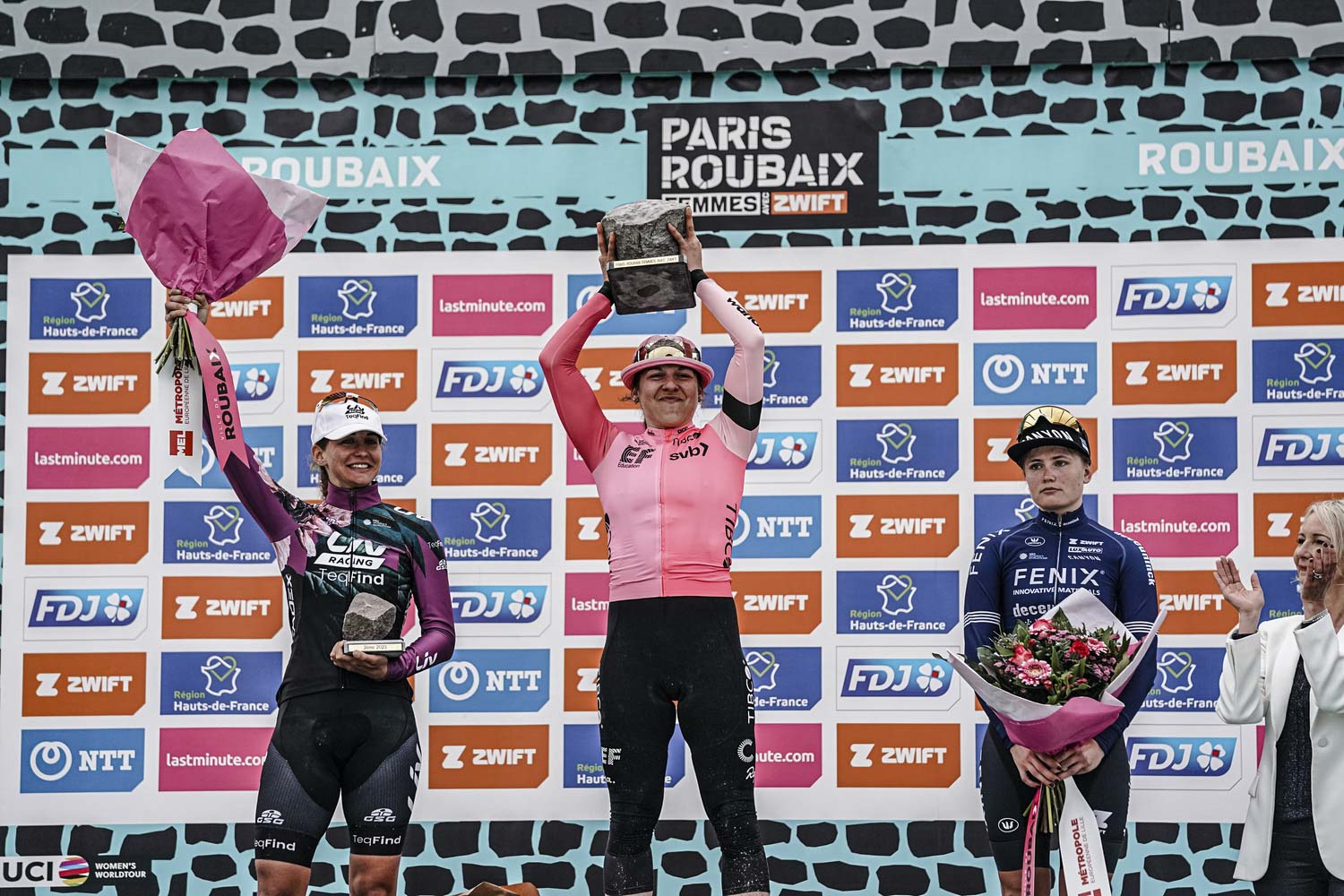
Photo A.S.O. / Thomas Maheux
AJ: This is a bigger deal than I think I knew it would be. I think the only thing comparable is an overall Tour de France win, for the amount of media attention. The thousands of message from fans and supporters being so proud of me and also being so inspired by how I won. My team mates, the staff members ... everybody has been just inundated with messages of congratulations. It has such a widespread ripple effect.
I want to have an impact on this world that is a real, positive, joyful kind of impact ... sometimes when you win a bike race you don't think too many people care much about it. You do and the people close to you, and the people in the sport get it, but this has really had such a big impact all over the globe, which has been really cool.
The thing is with Paris-Roubaix is that it has such a long history [since 1896], and there is no other race of its kind, and it is so hard to win. It's such a rough race; you have to defeat all odds of having any kind of bad luck, punctures, crashes, whatever. Your body gets rough and tumbled ... it's just such a hard race to win. The fans love watching this race because there is so much chaos and action. People want to watch it from Kilometre 0 to the finish because it never lets up.
It's even more meaningful for a Canadian to win; it's super meaningful for Linda Jackson [Canadian founder of the team], for EF Education-TIBCO-SVB to have a World Tour win like this, to have a Monument win ... it carries a lot of meaning and weight to a lot of people, which has been super inspiring to me.
Paris-Roubaix ... there is no other race like it. It's bigger than I imagined.
CC: So what's coming up for you?
AJ: I've had some people say to me, 'So, now you can go home and celebrate with your family' ... no, we're still in it [the season]. I've jumped into a bike race already this week [De Brabantse Pijl - 34th], and then Amstel Gold on the weekend [DNF] and then fly over to Panama to do PanAm Championships [Road]. In the sport of cycling we have a lot of races, but I'm going to take these spirits and confidence into the next races.
CC: So how are you going to get that big chunk of rock - the cobblestone trophy - home?
AJ: Yeah! Does anyone want to buy a plane ticket for a cobble trophy?
I still plan on racing full time in Europe for a number of years, so I'll keep it in my home in Girona and fall asleep looking at it as the last thing before I close my eyes.
CC: So will we see you at Nationals?
AJ: For sure, back in Edmonton! That's one of my big goals for the year, too.
CC: So enjoy this moment, because this is bike racing and there aren't that many big moments like this.
AJ: Thanks, Rob!
Related Photo Galleries
| Return to Cycling 4 Women homepage | Return to Canadian Cyclist homepage | Back to Top |
